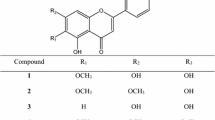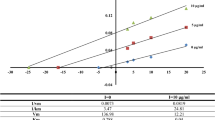Abstract
The Cornaceae family is mainly known for the research connected with its fruits and flowers, but the biological activities of leaves of Cornus species are not very intensively studied. Present work is focused on inhibition of rat lens aldose reductase, cytotoxicity, and study of oxidant efficacy on NIH-3T3 cells of the water extracts of the leaves of Cornus mas and Cornus kousa. The obtained results showed effective inhibition of isolated rat lens aldose reductase in low µg/mL level, antioxidant properties at lower concentration (50 µg/mL), and slight prooxidant properties at higher concentration (100 µg/mL). The prooxidant properties could contribute to cytotoxicity when the cells incubated with the extracts of concentration 100 µg/mL reduced 10% of MTT of control cells. The biological activities of two Cornus species were quite similar in all our tests. Low concentrations of both water leaves extracts could be perspective agents for potential treatment of chronic diabetic complications, inflammation, and another diseases connected with aldose reductase enzyme.



Similar content being viewed by others
References
Barski OA, Tipparaju SM, Bhatnagar A (2008) The aldo–keto reductase superfamily and its role in drug metabolism and detoxification. Drug Metab Rev 40(4):553–624. doi:10.1080/03602530802431439
Boots AW, Kubben N, Haenen GRMM, Bast A (2003) Oxidized quercetin reacts with tiols rather than with ascorbate: implication for quercetin supplementation. Biochem Biophys Res Commun 308:560–565. doi:10.1016/S0006-291X(03)01438-4
Forman V, Haladová M, Grančai D, Ficková M (2015) Antiproliferative activities of water infusions from leaves of five Cornus L. species. Molecules 20:22546–22552. doi:10.3390/molecules201219786
Forman V, Bukovský M, Grančai D (2016) Immunomodulatory activity of leaf infusions of selected Cornaceae species on human leukocytes. Nat Prod Commun 11:1–3
Gabbay KH (2004) Aldose reductase inhibition in the treatment of diabetic neuropathy: where are we in 2004? Curr Diab Rep 4(6):405–408. doi:10.1007/s11892-004-0047-z
Gonzales RG, Barnett P, Aguayo J, Cheng HM, Chylack LT (1984) Direct measurement of polyol pathway activity in the ocular lens. Diabetes 33:196–199. doi:10.2337/diab.33.2.196
Hayman S, Kinoshita J (1965) Isolation and properties of lens aldose reductase. J Biol Chem 240:877–882
Hotta N (1995) New approaches for treatment in diabetes: aldose reductase inhibitors. Biomed Pharmacother 5:232–243. doi:10.1016/0753-3322(96)82629-1
Jung HA, Yoon NY, Kang SS, Kim YS, Choi JS (2008) Inhibitory activities of prenylated flavonoids from Sophora flavescens against aldose reductase and generation of advanced glycation endproducts. J Pharm Pharmacol 60:1227–1236. doi:10.1211/jpp.60.9.0016
Kador PF, O´Meara JD, Blessing K, Marx DB, Reinhardt RA (2011) Efficacy of structurally diverse aldose reductase inhibitors on experimental periodontitis in rats. J Periodontol 82(6):926–933. doi:10.1902/jop.2010.100442
Laffin BJ, Petrash M (2012) Expression of the aldo-ketoreductases AKR1B1 and AKR1B10 in human cancers. Front Pharmacol. doi:10.3389/fphar.2012.00104
Lee DY, Song MC, Yoo KH, Bang MH et al (2007) Lignans from the fruits of Cornus kousa Burg. And their cytotoxic effects on human cancer cell lines. Arch Pharm Res 30(4):402–407. doi:10.1007/BF02980211
Ma W, Wang K-J, Cheng Ch-S, Yan G et al (2014) Bioactive compounds from Cornus officinalis fruits ant their effects on diabetic nephropathy. J Etnopharmacol 153:840–845. doi:10.1016/j.jep.2014.03.051
Matsuda H, Morikawa T, Toquchida I, Yoshikawa M (2002) Structural requirements of flavonoids and related compounds for aldose reductase inhibitory activity. Chem Pharm Bull 50(6):788–795. doi:10.1248/cpb.50.788
Metodiewa D, Jaiswal AK, Cenas N, Dickancaite E, Segura Aguilar J (1999) Quercetin may act as a cytotoxic prooxidant after its metabolic activation to semiquinone and quinoidal product. Free Radic Biol Med 26:107–116. doi:10.1016/S0891-5849(98)00167-1
Milackova I, Soltesova Prnova M, Majekova M, Sotnikova R, Stasko M, Kovacikova L, Banerjee S, Veverka M, Stefek M (2015) 2-Chloro-1,4-naphthoquinone derivative of quercetin as an inhibitor of aldose reductase and anti-inflammatory agent. J Enzyme Inhib Med Chem 30(1):107–113. doi:10.3109/14756366.2014.892935
O´Brien PJ (1991) Molecular mechanisms of quinone cytotoxicity. Chem Biol Interact 80:1–41. doi:10.1016/0009-2797(91)90029-7
Polat R, Cakilcioglu U, Satil F (2013) Traditional uses of medicinal plants in Solhan (Bingöl-Turkey). J Ethnopharmacol 148(3):951–963. doi:10.1016/j.jep.2013.05.050
Robaszkiewicz A, Balcerczyk A, Bartosz G (2007) Antioxidative and prooxidative effects of quercetin on A549 cells. Cell Biol Int 31:1245–1250. doi:10.1016/j.cellbi.2007.04.009
Soltani R, Gorji A, Asgary S, Sarrafzadegan N, Siavash M (2015) Evaluation of the effects of Cornus mas L. Fruit extract on glycemic control and insulin level in type 2 diabetic adult patients: a randomized double-blind placebo-controlled clinical trial. J Evid Based Complement Altern Med 740954:1–5. doi:10.1155/2015/740954
Son AY, Kim NK, Lee S, Singh D, Kim GR, Lee JS et al (2016) Metabolite fingerprinting, pathway analyses, and bioactivity correlations for plant species belonging to the Cornaceae, Fabaceae, and Rosaceae families. Plant Cell Rep 35(9):1917–1931. doi:10.1007/s00299-016-2006-y
Sozanski T, Kucharska AZ, Szumny A, Magdala J, Bielska K, Merwid-Lad A, Wozniak A, Dzimira S, Piorecki N, Trocha M (2014) The protective effect of the Cornus mas fruits (cornelian cherry) on hypertriglyceridemia and atherosclerosis through PPARα activation in hypercholesterolemic rabbits. Phytomedicine 21(13):1774–1784. doi:10.1016/j.phymed.2014.09.005
Srivastava SK, Yadav UCS, Reddy ABM, Saxena A et al (2011) Aldose reductase inhibition suppresses oxidative stress-induced inflammatory disorders. Chem Biol Interact 191:330–338. doi:10.1016/j.cbi.2011.02.023
Stefek M, Snirc V, Djoubissie PO et al (2008) Carboxymethylated pyridoindole antioxidants as aldose reductase inhibitors: synthesis, activity, partitioning, and molecular modelling. Bioorg Med Chem 16:4908–4920. doi:10.1016/j.bmc.2008.03.039
Vander Jagt D, Robinson B, Taylor KK, Hunsaker LA (1992) Reduction of trioses by NADPH-dependent aldo-keto reductases. Aldose reductase, methylglyoxal, and diabetic complication. J Biol Chem 267:4364–4369
Yadav UC, Srivastava SK, Ramana KV (2007) Aldose reductase inhibition prevents endotoxin-induced uveitis in rats. Investig Ophthalmol Vis Sci 48(10):4634–4642. doi:10.1167/iovs.07-0485
Yadav UC, Ramana KV, Srivastava SK (2011) Aldose reductase inhibition suppresses airway inflammation. Chem Biol Interact 191(1–3):339–345. doi:10.1016/j.cbi.2011.02.014
Yousefi B, Abasi M, Abbasi MM, Jahanban-Esfahlan R (2015) Anti-proliferative properties of cornus mass fruit in different human cancer cells. Asian Pac J Cancer Prev 16(14):5727–5731. doi:10.7314/APJCP.2015.16.14.5727
Acknowledgements
This work was supported by the grants VEGA-1/0646/14, VEGA-1/0290/16, APVV-15-0308 and VEGA-1/0048/15. Acknowledgments for additional material and working help belong to Dr. Vladimír Forman. Kind acknowledgments belong also to Mária Červeňová and Karol Pavlovkin for helping us with the English language.
Author information
Authors and Affiliations
Corresponding author
Rights and permissions
About this article
Cite this article
Miláčková, I., Meščanová, M., Ševčíková, V. et al. Water leaves extracts of Cornus mas and Cornus kousa as aldose reductase inhibitors: the potential therapeutic agents. Chem. Pap. 71, 2335–2341 (2017). https://doi.org/10.1007/s11696-017-0227-3
Received:
Accepted:
Published:
Issue Date:
DOI: https://doi.org/10.1007/s11696-017-0227-3




